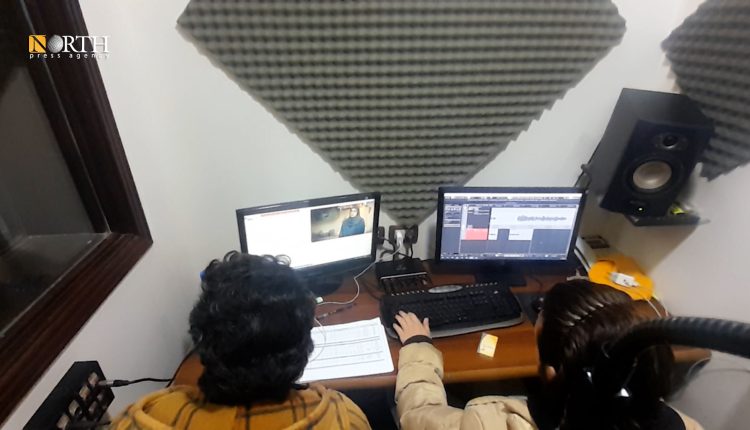
By Ahmad Kan’an
DAMASCUS, Syria (North Press) – The Kurdish language entered the world of dubbing in Syria several months before the fall of Bashar al-Assad’s regime, practiced at the time in complete secrecy due to fears of well-known security crackdowns on any activity conducted in Kurdish.
The Kurdish language had been banned for decades under the al-Assad regime (both father and son), and while the situation became more relaxed after the regime’s collapse on Dec. 8, 2024, challenges still persist.
Security fears
Ezzedine Abu al-Qasim, grandson of the late Syrian actor Abdul Rahman Abu al-Qasim and one of the directors of the “Abu al-Qasim” company for dubbing dramas, told North Press, they began dubbing into Kurdish during the rule of the al-Assad regime and were met with concerns from some actors who feared security persecution simply for performing in Kurdish.
He added that some feared the consequences of working in Kurdish, but the company assured them to maintain secrecy to ensure their safety.
“We managed to overcome this major challenge as the first company to dub into Kurdish.”
Dubbing to Arabic saw a boom in 2004 with Turkish series, which attracted large audiences according to observers, though critics often labeled them as poor.
After Saudi Arabia’s MBC Group decided in 2018 to stop airing Turkish dramas, dubbing companies increasingly turned to Venezuelan, Mexican, and Portuguese series.
His brother, Omar Abu al-Qasim—who co-manages the company—explained that they launched “Abu al-Qasim” in 2012. The company initially produced Arabic-dubbed content, until they were approached with a proposal to produce Kurdish-language dubbed series.
He told North Press that the idea felt like an adventure. They knew how much effort it would take, but they were passionate about it.
So they immediately reached out to well-known Kurdish artists—actors, directors, and theater professionals.”
In addition to the typical challenges of dubbing—where actors must convey all dramatic nuance using only their voice—the Kurdish-language dubbing field also struggles with the limited number of Kurdish-speaking actors based in Damascus.
Challenges
The company director said the chosen dialect for Kurdish dubbing is Kurmanji, because it is widely understood by most Kurds and serves as a kind of ‘standard dialect.’
Kurmanji is spoken by Kurds in Syria, Turkey, and parts of Iraq, while Sorani is more prevalent in Iraq’s Kurdistan region and among many Kurds in Iran.
He noted that the company dubs a wide variety of content—including Iranian, Turkish, and Korean series—and said some Kurdish-dubbed Turkish series have been especially successful.
Actor and artistic supervisor Khoshnav Zaza told North Press that dubbing is challenging regardless of the language.
The challenge lies in having to express every emotional and physical nuance—like fear or being hit—solely through your voice, he noted.
He added that the voice actor must match or closely mirror the emotional expression of the actor in the original work.
Zaza also pointed out that another major challenge in Kurdish dubbing is the limited number of Kurdish-speaking actors—both Kurdish and non-Kurdish—from Hasakah Governorate who are now living in Damascus.
“We had to rely on Kurdish individuals and even non-Kurds, and train them on how to deliver lines, how to pronounce the words, how to express that emotion,” Zaza explained.
“So we focused a lot on actor training. That was a big part of the effort, and a credit to Abu al-Qasim Company, for how they managed their time and dedicated extra hours to overcome these challenges, especially with people playing roles who were not trained actors.”
Zaza emphasized, “Kurdish language is a mother tongue, a language present in Syria. It’s beautiful to add Kurdish to Syrian languages by acting or dubbing in Kurdish.”
He continued, “When I act in Arabic as a Kurd, I internally translate the emotional tone of the line into Kurdish before delivering it in Arabic. But when I act in Kurdish, the sentence enters my subconscious directly and the emotion flows out instantly—because it’s my mother tongue.”
